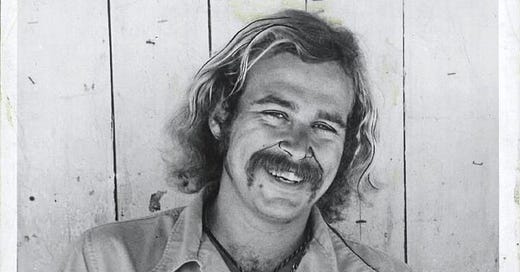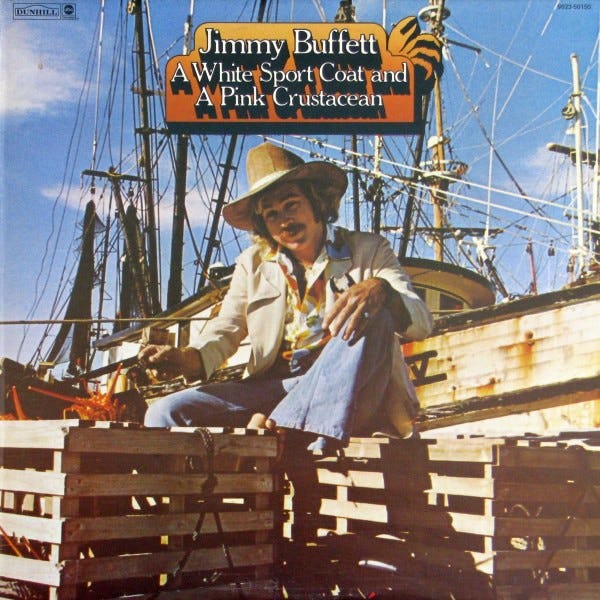When Jimmy Buffett Became One of America's Finest Songwriters: Let's Listen to 'A White Sport Coat and a Pink Crustacean' Which Is Celebrating a 50th Birthday
The 1973 album is when Buffett grew a mustache and took his first steps towards becoming an institution.
If you enjoy this look back at a classic record, why not share or subscribe to Check This Out!? You’ll receive fresh tunes in your inbox three times a week while supporting this entirely independent music e-rag. Rad!
For this year’s album anniversary newsletters, I found myself in 1973 a few times, revisiting Bruce Springsteen’s electric debut on Greetings From Asbury Park, N.J., and giving a first real listen to Fleetwood Mac’s oft-forgotten, Penguin.
While scanning this summer’s fiftieth anniversaries, I realized I was busted, and it’s time for me to admit I’m a Parrothead publicly.
Yes, it goes against all of the latest hip and under-the-radar stuff I try to bring you weekly with Check This Out! but dammit, I’ve never been able to resist some classic-era Jimmy Buffett.
My fandom goes all the way back to middle school, where I once found myself in the principal’s office for strumming my guitar and singing “Why Don’t We Get Drunk” on the front lawn during a lunch break. Luckily, the principal was a Deadhead1 (who often wore ties with the dancing bears on them) and was on the same humor wavelength after a quick “you know why you can’t do this” talk.
A few years later, you could find my ‘98 Subaru Forester sporting a UNIVERSITY OF MARGARITAVILLE window decal for as long as I owned that wonderful ride. While I was ready to show my Parrothead card, the purchase mostly came from a chuckle at the idea of people posting their alma maters in their rear windows.
Hope you had fun at Yale. We’ll be at the beach drinking from a “Tin Cup Chalice.”
It’s easy to dismiss Buffett in the twenty-first century because the guy is now probably just as known for his restaurants, resorts, and retirement villages as much as he is for his music. But starting with A White Sport Coat and a Pink Crustacean, Buffett went on one helluva record run that was almost flawless through the seventies and still pretty good into the eighties. But regarding the later stuff with Kenny Chesney and Toby Keith, no thanks.
I’ve talked about this a bit with fellow Substacker Kevin Alexander, who recently ran a great one about his family’s tradition of still listening to “Volcano” annually for the anniversary of Mount St. Helens’ eruption. Buffett is one of the great American songwriters because he is, first and foremost, an excellent and engaging storyteller. Don’t believe me? Bob Dylan mentioned Buffett first, followed by Gordon Lightfoot, Warren Zevon, Randy Newman, John Prine, and Guy Clark when asked who his favorite songwriters were in an interview. That’s one wicked endorsement.
His debut album, Down to Earth, and its follow-up, High Cumberland Jubilee (unreleased by the label until Buffett found success a few years later), found Buffett as a struggling singer-songwriter in Nashville. While both are pretty solid, neither sounds anything like what we know Buffett for now, and both sold poorly on old-fashioned Andy Williams’s Barnaby Records. A jump to the newer and hip Lou Adler’s (producer for The Mamas & The Papas, Carole King, Barry McGuire, etc.) Dunhill Records for A White Sport Coat and a Pink Crustacean still saw poor sales, but it marks a change in sound for Buffett, who grew a mustache and leaned into his Gulf Coast roots, combining them with Nashville’s country sound. The dichotomy of this album is apparent in the title, riffing on Marty Robbins’s “A White Sport Coat and a Pink Carnation” or by scanning the record’s cover, where Buffett wears a sizeable cowboy hat in front of a large trawler.
Another reason this can be considered the first definitive Buffett album is the mention and inclusion of his backing band, the Coral Reefer Band. This early iteration includes a killer lineup featuring studio cats like Steve Goodman, a singer-songwriter himself, who wrote the oft-covered “City of New Orleans,” guitarist Reggie Young (Elvis, John Prine, Willie Nelson, etc.), and drummer Sammy Creason (Bob Dylan, Aretha Franklin, Charlie Rich, etc.). With a little more turnover than the E Street Band, the Coral Reefers tends to be a long-term (and I’d imagine well-paying) gig, and there are a few players on this record that are still in the band, like pianist Mike Utley, and Doyle Grisham, who plays a wicked pedal steel guitar.
The combination of Buffett’s storytelling and a steady, talented band to support him pays off immediately with the opener, “The Great Filling Station Holdup.” Buffett writes a story straight from the newspaper - a song about a couple of lowlifes robbing a gas station before being taken in by the cops while sipping on some beers at a honkeytonk, and no fame or fortune in tow. Grisham’s pedal steel provides the country textures, and longtime Coral Reefer Greg “Fingers” Taylor drives the song with his belting harmonica, giving it a proper heist-chugging rhythm. Finally, with his fifth single, Buffett had a song that tickled the country charts, an unexpected turn for a songwriter who wasn’t interested in country music even just a year earlier.
Released a few months ahead of A White Sport Coat and a Pink Crustacean, “The Great Filling Station Holdup” included the above-mentioned “Why Don’t We Get Drunk” as its b-side, which quickly built its lore thanks to bar jukeboxes. Written as a parody of the new country sound at the time, Buffett never intended for the song to be on the album. The label only promoted the a-side of the record, but thanks to them providing jukebox operators with fifty thousand copies, the song became a barroom legend. In 1992, Buffett had this to say about “Why Don’t We Get Drunk” in the liner notes for the Boats, Beaches, Bars, and Ballads box set:
"I was hearing a lot of very suggestive country songs—in particular, Norma Jean's ‘Let's Go All the Way.’ I figured I would write a song that would leave no doubt in anybody's mind. I thought back to a late night in an Atlanta diner where I was eating and watching this out-of-focus businessman trying to pick up a hooker. That's all the inspiration I needed.”
The other song to chart from the album is the now classic “Grapefruit-Juicy Fruit,” a song written by Buffett in his early Key West days while playing at a bar in the afternoons and picking up female tourists to take to the drive-in later in the evening. “He Went to Paris” was the final single released, and although it didn’t chart, Buffett has gone on to say that it’s his favorite song he’s written. Leaving the barrooms that fill most of the songs on A White Sport Coat and a Pink Crustacean, Buffett wrote the reflective ballad about Eddie Balchowsky, a musician and Spanish Civil War veteran he met while playing a show in Chicago. The heartbreaking yet joyous song contemplates the passage of time and all of life's curveballs. It became a fan favorite after being included in the massive-selling greatest hits compilation, Songs You Know By Heart.
“Cuban Crime of Passion” is the first song to fully embrace Buffetts’s oncoming self-coined “Gulf and Western” sound. Co-written with mystery author Tom Corcoran, who would also go on to help write the legendary “Fins,” the song follows the fictional Billy Voltaire, a Miami piano player that finds himself in Havana, and things don’t end well after he meets a dancer named Marita. Buffett and Corcoran end up spinning quite the yarn.
The album’s best example of Buffett’s natural gift for storytelling is easily “Peanut Butter Conspiracy,” one of his oldest numbers in the songbook. A true tale of an artist’s early struggles playing the bar circuit in Hattiesburg, Mississippi, Buffett and his bandmate find themselves stealing peanut butter and sardine cans from the corner store. A key piece to the song is the refrain, “We never took more than we could eat, there was plenty left on the rack, we all swore if we ever got rich, we would pay the Mini Mart back,” which has always left me wondering if Buffett paid his tab now that he’s jumped all of the tax brackets. Thanks to this video of Buffett talking about it from a few years ago, we now have the answer:
If you’ve never listened to A White Sport Coat and a Pink Crustacean because you don’t fancy yourself a Parrothead or maybe didn’t even know it exists, I encourage you to give it a chance. Long before the Captain Ron schtick that would define Buffett’s music career, he was a broke songwriter still trying to find his sound.
Fifty years ago, the Coral Reefers moved things in the right direction. Still, most importantly, A White Sport Coat and a Pink Crustacean is the first real opportunity for Buffet to show why he’s one of the greatest storytellers of our time.
Love or hate Buffett? Any thoughts on A White Sport Coat and a Pink Crustacean? Let me know in the comments!
There was a good handful of old Deadheads teaching at my middle school, now that I think about it. I guess I’m thankful cos they went easier on us than others and understood that teenagers are a nightmare. If you want another good story from that era, dig into the archives and read this one about my art teacher encountering Limp Bizkit for the first time.







He just hasn't been the same since he shaved that mustache. ;)
I've never been a big Buffett fan other than the obvious "Margaritaville" and "Cheeseburger in Paradise." That said, it doesn't mean he hasn't influenced me. The most popular song I've ever written and recorded ("Mexico") is often compared to Jimmy Buffett.
I am going to give "A White Sportcoat and a Pink Crustacean" a shot!
I find it interesting that I read your music reviews to understand the number of times you ended up in the principal's office... :) In grade school when you ended up in the principal's office, afterwards I made you clean out the garage. Lesson learned - you never told me again about your future visits.